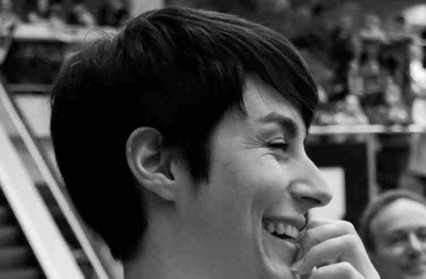Aeschylus’s trilogy, The Oresteia – the only extant example of a complete trilogy of ancient Greek theatre – is back in fashion. Robert Icke’s much-praised radical update opened at the Almeida theatre in north London and has now transferred to the West End. Manchester’s revival of Ted Hughes’s translation, directed by Blanche McIntyre, opens next month and in the middle stands Adele Thomas’s innovative production for London’s Globe Theatre.
Linda Christmas discovers how the girl from Port Talbot got to meddle with the Greeks at The Globe.
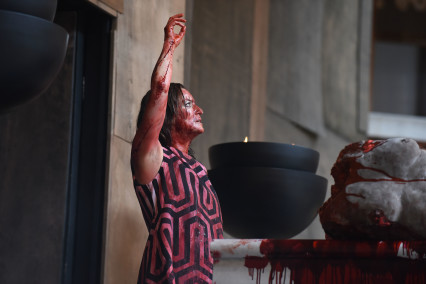
If you come from a working class home in Port Talbot it’s possible (thanks to Burton and Hopkins) to imagine a career as an actor, but donning a directorial hat is off the radar – even if you did prance around at primary school making little plays. So Adele Thomas, whose father is a tool-maker and whose mother worked in a bank, flirted with singing and acting while she was at 6th form college, read her father’s art books (he is a good painter), watched MTV and devoured many a movie on the multi-channel tele. It wasn’t until she went to university that she unearthed a talent for directing, and even then it was by accident.
‘I only applied to Cambridge as a bet as I didn’t think it was an option – my parents have got one O-level between them. I got in by being a cocky little shit and quoting Peter Greenaway movies. My knowledge of films, plus acting and singing, was obviously enough to show Cambridge that I was curious and interested in things. Once there, I volunteered to direct The Importance of Being Ernest because no-one else wanted to do it and I completely fell in love with the idea. Cambridge was a big kick-up-the-arse for me: all the middle-class kids thought they could do whatever they wanted in life, and that led me to think I could do anything I wanted.
‘Being a director is a bigger vision and it is exciting not to be in a performance, but to stand outside and to watch it happen. The thing I love most is watching an audience lose themselves… it’s so exciting… I delight in people’s talent and things exploding on stage, emotions, music, everything.’
Oscar Wilde’s farcical comedy was an odd initiation because that sort of middle-class night out is not where her heart lies. Working on Michael Sheen’s The Passion was more appropriate.
‘The show made and broke me for all eternity. It nearly killed me. I worked with drug addicts, young offenders, young carers – people who make other people’s unbearable lives possible! Those 18 months were emotionally draining. When I think of parts of it now, I want to bawl my eyes out!’
It might have been less draining if it had led to offers of work, but it did not.
‘No one seems to realise I worked on it.’ For months and months she struggled and then she got a call from the Royal Court. ‘I was dragged to London by the lack of work in Wales. They don’t seem to support young directors there. But the Royal Court did.’
And so does the Globe. It is now her family. She is at home. That was obvious by the way she steered me through the back stairs onto the roof where it was quiet enough to talk.
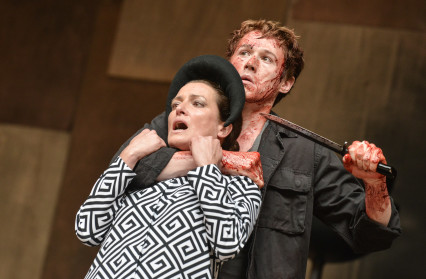
‘This place is brilliant. There are 700 standing seats for £5 for every performance, and these offer the best view of the stage. The locals come, everyone is included.’
Dominic Dromgoole, the artistic director, asked her to direct Francis Beaumont’s Knight of the Burning Pestle which at first she saw as a poisoned chalice, but in the end the politics of it caught her imagination. It’s the story of a grocer and his wife who go to see a play about the merchant-class and, as part of the ‘the audience’ they kick up a fuss demanding to see a play for commoners with their son Ralf as the hero doing great things, like battling with giants. It is rowdy, slapstick, Pythonesque. And good enough to have attracted famous names to the part of Ralf: Noel Coward, Ralph Richardson and Timothy Spall.
‘I’ll never recapture how beautiful that project was… it was charmed.’
The critics found Thomas’s production capable and spirited, and Michael Billington of the Guardian said the production ‘took the play off the academic shelf and gave it new life.’
That is what she is aiming to do with the Oresteia.
‘Dominic told me about his season of plays under the umbrella of Justice and Mercy and at first I thought I wanted to do Measure for Measure, but changed my mind on the way back to Cardiff (which she visits regularly because her partner of 17 years, whom she met when she was 17, lives in Cardiff). ‘I decided I wanted to have a go at the Oresteia but I was too shy to ask him so I sweated it out until the call came. I was so excited. How wonderful to do a play that was the founding piece of theatre; a play about the cornerstones of democracy; a play about the way justice and mercy – the rule of law – end years of violent vendetta.’
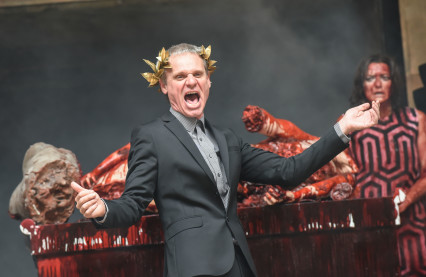
In the play, Agamemnon kills his daughter in order to persuade the Gods to aid his path to Troy; ten years later Agamemnon’s wife, Clytemnestra kills Agamemnon as vengeance for killing their daughter, and having the nerve to return from the wars with a concubine, Cassandra. Orestes, their son, kills his mother and her lover in vicious retaliation for the killing of his father. The Goddess Athena says, ‘That’s enough’. There is a trial which results in an ‘equally divided’ jury, and Athena shows mercy and pronounces Orestes to be innocent.
She knew immediately whom she wanted to undertake a new translation of Aeschylus’s trilogy: a young writer called Rory Mullarkey whose first full length play, Cannibals, had impressed her.
‘He’s a genius! We went through every line together to work out how we could keep the structure and compress rather than cut the original from six hours to three. Rory then went off to work with Lucy Jackson, who has studied the theory and practice of producing Greek drama and whose PhD is on the Greek Chorus.’
Mullarkey came back with a play in verse that is, like the original, poetic and lyrical in part but also colloquial and vibrant and at times stunningly raw. One critic said he would never forget how Clytemnestra described Cassandra whom Agamemnon had brought back with him from Troy:
This two-bit soothsayer, this cheap priestess,
This sour-faced slut who sucked the sailors raw.
Mullarkey has dropped a long choral ode at the opening of the third play, Eumenides and inserted 50 lines of his own. These include: ‘… it only takes a flower-petal’s fall to start an earthquake…’ or ‘a vote to go one way, for those in charge to dismantle your rights.’
This was done to emphasise Adele Thomas’s core message – the danger of apathy, of people noticing what is going on but doing nothing.
‘You must not stand around and just let things happen; you have an obligation to take part in your society!’
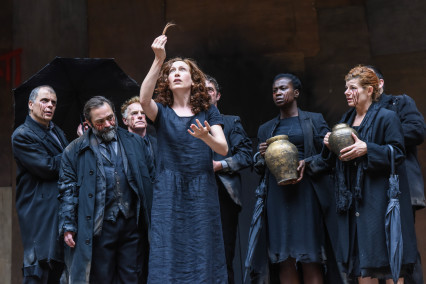
Thomas is openly political – she says she would consider politics if her directing career ever stalled. Her conversation is peppered with anti-Tory views and her belief that Cameron could dismantle our rights and institutions. There’s a threat to the Human Rights act for a start, and the NHS and the BBC.
The chorus, who have the largest role, are the ones who, she says, can be charged with apathy. They say:
Why go over and over the woes of the Past? Only speak good things tonight.
Thomas has dressed the chorus as a bunch of suited bureaucrats. She got the idea from an image in a movie by Swedish director, Roy Andersson, in which a bunch of men, dressed in their polyester suits, stood by and watched atrocities.
Alongside the suited chorus the rest of the cast are clothed eclectically (by Hannah Clark), part formal, part Grecian, part gorgeous (black and white, black and gold, and gold for Clytemnestra, Cassandra and Athena) – part trashy and trendy (the furies as Goths spewing black bile). They perform against a boarded-up stage which looks like parts of Athens today.
‘We had to neutralise the Globe’s colourful, decorative stage. It would not have fitted our mood – I wanted it to look a bit bombed out.’ Across the boards, ‘Blood for Blood’ is scrawled in Greek, graffiti style. Some critics found that this approach lacked cohesion but it fitted well with the script which is also eclectic in style. The ending is witty and brash: a huge golden penis is paraded mardi gras style. The Oresteia does indeed end in a procession but the golden penis is the girl from Port Talbot having not so much the last laugh as the last political comment: the women may be strong but government is still a phallocracy.
The Oresteia is at London’s Globe Theatre until October 16, 2015
Header photo courtesy of Adele Thomas. All production images credit: Robert Day.


